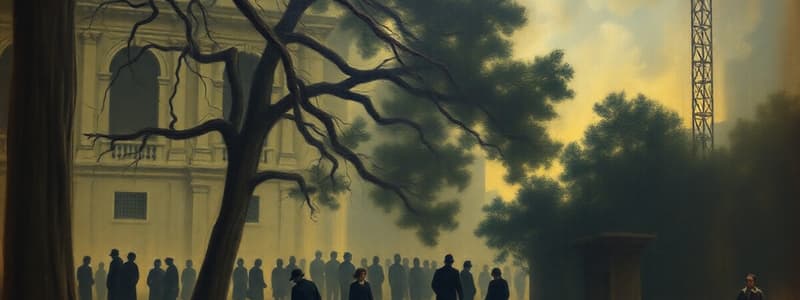Podcast
Questions and Answers
What year did Cesare Beccaria publish his influential work?
What year did Cesare Beccaria publish his influential work?
- 1764 (correct)
- 1789
- 1750
- 1800
What was the primary focus of early Classical theorists regarding crime?
What was the primary focus of early Classical theorists regarding crime?
- Human free will and rational decisions (correct)
- Understanding societal influences on criminal behavior
- The biological causes of criminality
- The significance of psychological development
What is one major assumption of the Classical School?
What is one major assumption of the Classical School?
- Punishment should be proportional to the crime. (correct)
- Humans are inherently criminal.
- All behavior is determined by environmental factors.
- Crime is a social construct.
What external influences might affect an individual's ability to make rational decisions according to the Classical framework?
What external influences might affect an individual's ability to make rational decisions according to the Classical framework?
What is a key criticism of the Classical model that emerged in the late 19th century?
What is a key criticism of the Classical model that emerged in the late 19th century?
How do modern perspectives differ in their view of criminal behavior compared to Classical concepts?
How do modern perspectives differ in their view of criminal behavior compared to Classical concepts?
What role does free will play in the Classical framework of criminal justice?
What role does free will play in the Classical framework of criminal justice?
What implications does the Classical School have on contemporary criminal justice policies?
What implications does the Classical School have on contemporary criminal justice policies?
Flashcards are hidden until you start studying
Study Notes
Classical Criminology
- 1764: Cesare Beccaria published On Crimes and Punishments.
- Free will and rational choice: Early Classical theorists believed that individuals make conscious decisions to commit crimes.
- Deterrence: Punishment should be proportional to the crime and swiftly administered to deter future offenses.
- Focus on crime prevention: Classical thought emphasized the importance of clear laws and punishments to deter criminal behavior.
- Criticisms: The Classical model faced criticism in the late 19th century for its failure to consider social and economic factors that contribute to crime.
Modern Classical Theories
- Rational choice theory: Individuals weigh potential costs and benefits before committing crimes.
- Lifestyle perspectives: Criminal behavior is influenced by an individual's daily routines, activities, and social circles.
- Routine activities: The presence of motivated offenders, suitable targets, and the absence of capable guardians creates opportunities for crime.
- Perceived benefits and criminal activity: Modern theories suggest that individuals are more likely to commit crimes if they believe the rewards outweigh the risks.
Decision-Making
- Free will: The Classical School emphasizes individuals' free will and ability to make rational choices.
- Cost-benefit analysis: People weigh the potential costs (punishment) against the benefits (gain) of committing a crime.
- External influences: Factors such as poverty, social inequality, and lack of opportunity can influence an individual's ability to make rational decisions.
- Individual responsibility: The Classical model emphasizes individual responsibility, placing the burden on individuals to make ethical choices.
Impact on Policy
- Deterrence-based policies: The Classical School influenced the adoption of policies based on proportionality and swiftness of punishment.
- "Get tough" movement: A modern trend emphasizing stricter sentencing and increased incarceration, reflecting Classical principles.
- Relevance in contemporary criminal justice: Classical theories continue to play a role in law enforcement, sentencing, and crime prevention strategies.
- Application of Classical concepts: Practitioners use Classical concepts such as deterrence and risk assessment in their decision-making.
- Significance in Western criminal justice systems: Classical theories continue to be a significant foundation for Western criminal justice systems today.
Comparison with Other Theories
- Focus on individuals: The Classical School contrasts with other criminological theories like sociological theories, which focus on societal factors.
- Potential benefits of criminal behavior: In contrast to the Classical model, some modern theories recognize that criminal behavior can offer individuals perceived benefits like social status or financial gain.
- Comparison: The Classical model can be compared with contemporary theories like social disorganization theory, which emphasizes the role of community factors in crime.
Studying That Suits You
Use AI to generate personalized quizzes and flashcards to suit your learning preferences.




